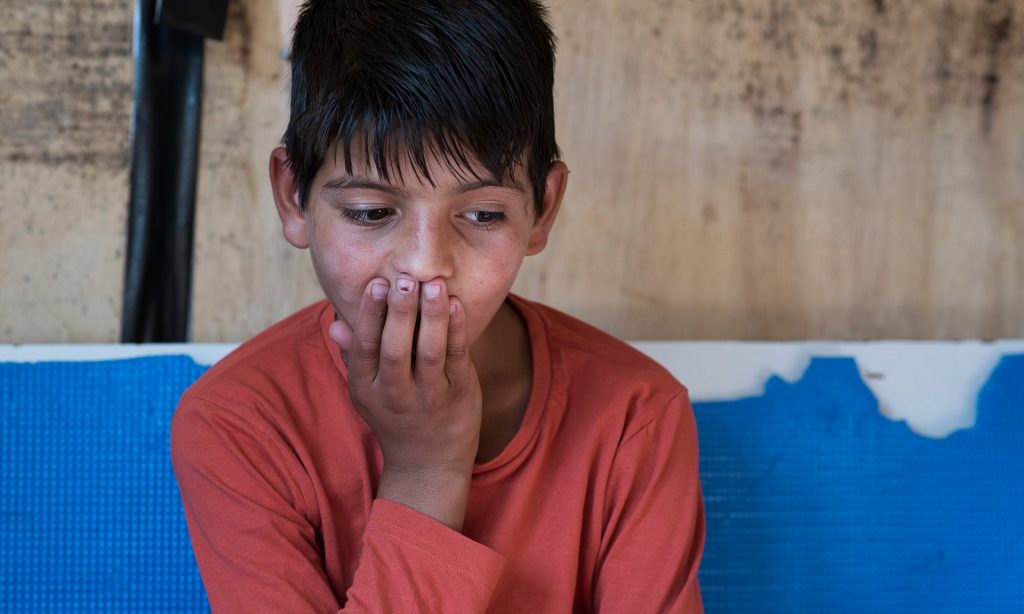
Abdul, 10, lives on his own in Calais, where he looks after his nine-year-old nephew as they try to get to the UK.
Photograph: Alecsandra Raluca Drăgoi for the Guardian
What does a 10-year-old living alone in the migrant camp in Calais worry about most? Abdul is bothered by the rats that rustle around him while he sleeps and by the effort involved in getting enough food, in the wake of a decision last month by the French authorities to close down the cafe that fed children for free.
He is frightened of the local police who often spray teargas at him. Most of all he worries about his nine-year-old nephew, who is solely his responsibility, and who is struggling to cope with their five-month flight from violence in Afghanistan.
Mohammed, nine, worries about how he is going to find a pair of shoes. His cousin Ahmed, 12, worries about Mohammed, and about a third cousin, nine, who went missing last week. He is also anxious about how to conceal his unhappiness from his parents, when he speaks to them on the phone in Afghanistan. They sold half their land to send him, the oldest child, away from Isis to safety in England.
“I tell them I am in a good place and in a good situation, and that I am very happy,” he said.
But the Calais camp, Europe’s biggest slum, is not a good place. Ahmed’s situation is dire, and neither he nor any of the 600 or so children who are living here, without parents, could be described as happy.
This week it is three months since the government passed a landmark amendment promising sanctuary to unaccompanied, vulnerable child refugees like these boys. In May, Labour peer Alf Dubs, who was brought to Britain as part of the Kindertransport scheme in 1939, shamed colleagues in the House of Lords and Commons into action and forced the government into a U-turn on its position on child refugees.
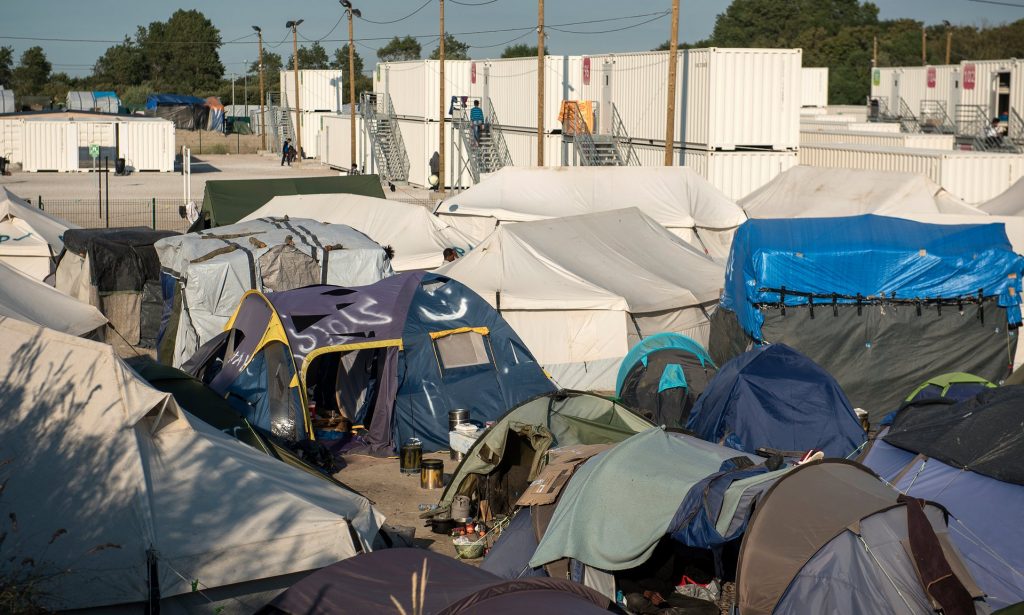
Photograph: Alecsandra Raluca Drăgoi for the Guardian
The Dubs amendment was included in the Immigration Act, committing the government to relocate to the UK a number of lone child migrants “as soon as possible”. Although no figure was specified in the final legislation, it was understood that homes would be found for several thousand. The then immigration minister James Brokenshire said: “We have a moral duty to help.”
Charities hoped that the UK would swiftly begin to accommodate large numbers of the estimated 88,000 unaccompanied child refugees in Europe, but by the start of this week fewer than 20 had arrived under the scheme. Lord Dubs has condemned the “shocking” lack of urgency in the government’s response that was forcing very young children to continue living in “intolerable conditions”.
This week, the Guardian interviewed several children, aged nine to 12, all of whom arrived in Europe before 20 March (a criterion set out in the legislation to prevent more children from being sent away by their parents alone), all potentially eligible to be helped to safety in the UK under the Dubs amendment.
The most recently arrived still display flashes of humour and childish behaviour; the boys who have been here closer to a year have dulled expressions and say little. Volunteers helping to look after some of the hundreds of unaccompanied children living in tents and shacks in Calais are not aware of any coordinated attempts by officials for the UN high commissioner for refugees, or officials from France or the UK, to seek out the most vulnerable and make arrangements to help them find safe homes either in the UK or France. They are despairing at the delay.
The vast majority of unaccompanied minors are older boys, and some (about 200) have been accommodated in white metal containers behind fences, overseen by the French state. But there is a group of at least 30 very young children, travelling alone, who have no contact with the state. There is no question about their age or vulnerability – some of them have recently lost baby teeth, they speak with young childish voices, they are physically tiny. Hamid, nine, the most traumatised of the children we met, was wearing a T-shirt illustrated with zoo animals, and spent much of the conversation with his head in his hands, or hugging his arms tight to his chest, a deep frown line already creasing his forehead.
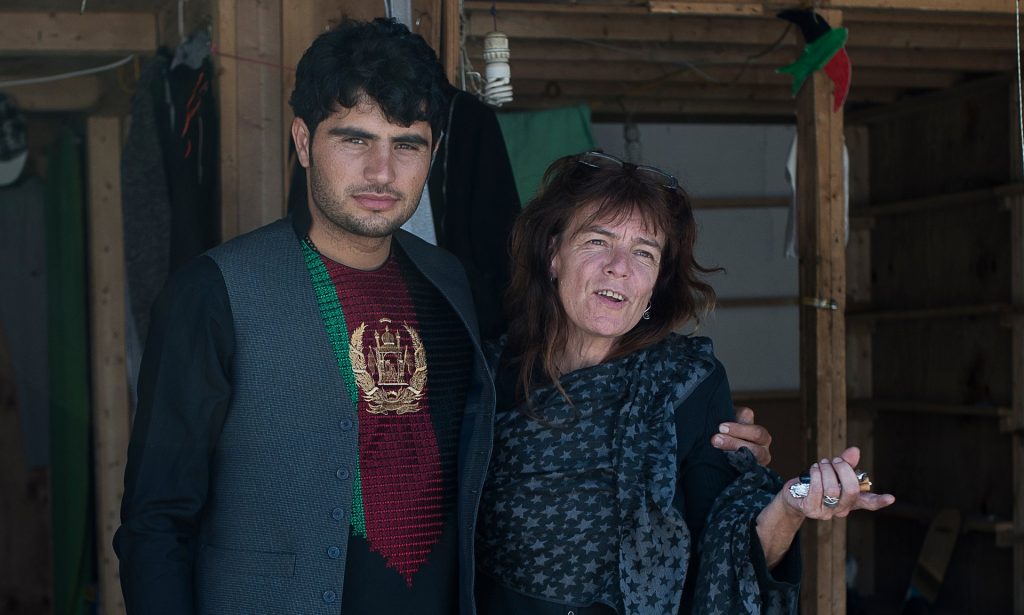
Photograph: Alecsandra Raluca Drăgoi for the Guardian
Liz Clegg, a volunteer from Devon, who in the absence of any mainstream children’s charities, has been living on-site for the past year, devoting herself to caring for the youngest boys – several dozen very vulnerable children under the age of 13 – said they need urgent help.
“Nothing meaningful has happened. I feel disgusted and ashamed. We have identified that there are large numbers of vulnerable children who are not on the radar of the authorities and due to their age they are in extreme danger. The British government needs to step in,” she said.
She is particularly concerned by the risks that very young children are exposed to every night when they attempt to smuggle themselves on to lorries to the UK. Most of the boys leave the camp every evening at about midnight and spend the night on the edge of the motorway, waiting for an opportunity to climb into the back of a lorry, returning every morning at dawn, having failed. In the past six months, several refugees have died on the road and many of the young boys she has worked with have gone missing.
“These children are stressed, tired and incredibly vulnerable. They are trying every night to negotiate climbing on to lorries on the motorway. The whole point of the Alf Dubs amendment was about an immediate response – it is not about setting up a process.
“I feel dread every day when I come in, wondering if we have lost another one. I can’t stand the idea that we will lose another child. It’s terrifying, watching them go out at night, knowing the dangers.”
She was extremely worried about a 15-year-old unaccompanied boy who was shot in the head with a rubber bullet by police last month and who is still in pain. Lying beneath a pink blanket in a hut, he showed his bandaged wound, but he was not well enough to talk.
Recently she has sensed that public concern internationally for the fate of refugees is dwindling. “It feels like the momentum has gone off the boil. People can’t sustain that level of disgust; their attention drifts back to EastEnders,” she said. Help Refugees, which is the largest provider of aid in the camp, said donations of food and clothes have declined and there is not always enough food to distribute. New children arrive on their own from Syria, Iraq, Afghanistan and Eritrea every day.
It would be hard to design a more unsuitable home for primary school-age children living without their parents. Despite a move by the French authorities to bulldoze half the area, the population continues to grow, and now stands at 7,000, mostly men – higher than it has ever been. Most unaccompanied children live in second-hand camping tents or tiny roughly built wooden huts, which are mostly not waterproof and often infested with fleas. With so many tents crammed close together, fires are a constant problem. Several children said they had lost the few possessions they came with in tent fires.
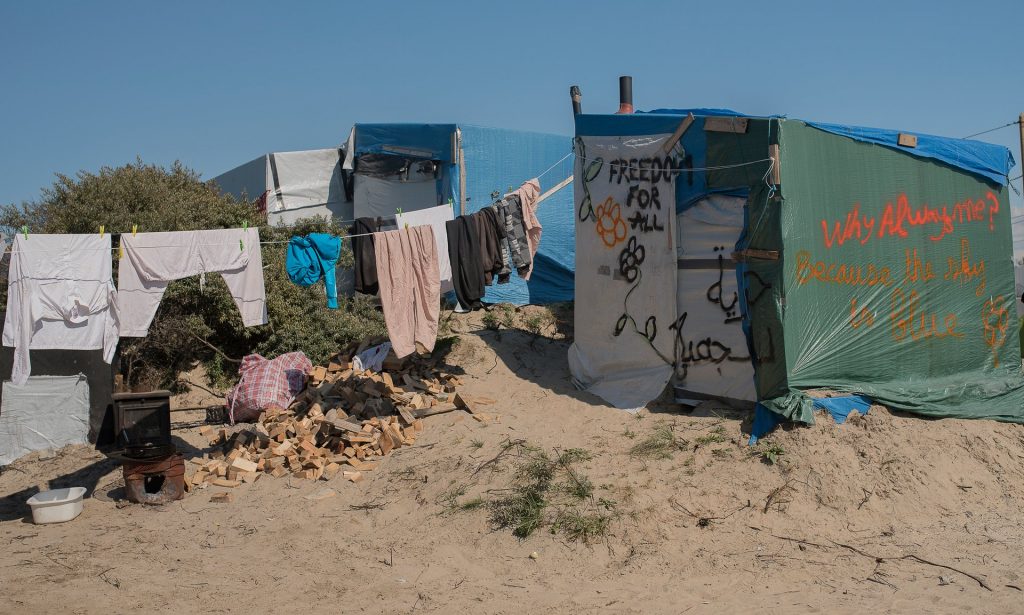
Photograph: Alecsandra Raluca Drăgoi for the Guardian
Water supplies are scant, there is no electricity. Adults queue for up to an hour in the evening, in a line that snakes 50 metres through the camp, for a hot meal cooked by Malaysian volunteers. Because the children are awake all night, they are mostly asleep during the day when volunteers open schools – although some have been attending occasional English classes.
Life is easier in the summer, but new problems (mainly the rats) have arrived with the heat. Along the pathways between tents there is rubbish everywhere – dead rats being eaten by flies, abandoned shoes and bedding, crushed cans of Monster (the high caffeine drink which, along with Red Bull, is popular with people who spend the night trying to get to the UK). As you approach the camp on foot from the police checkpoint, the scent of summer grass and flowers is gradually replaced by the smell of burning plastic and destitution.
The children all said they were horrified by their first sight of Calais. Omar, 12, who left home at the start of the year and arrived here three months ago, after a journey that took him through eight countries, was dismayed when he arrived.
“I thought there would be nice houses. I thought it would be like the Europe we see on television at home; it isn’t like that. Sometimes there is nice food, sometimes there isn’t. I get very hungry at lunchtime, I have to search for food, we stand in line. Sometimes you queue and the food runs out. There is less food now than before,” he said. He misses his home in Afghanistan. “My mum would make a nice bed for me; here I sleep anywhere.”
“These children are shocked when they come here to see people burning old shoes to heat up a can of beans,” Clegg said.
None of the children have any money, and although many families paid thousands of pounds to people-smugglers, they have been left to navigate the final stage of the journey alone. “One day I wanted to get on a lorry, they put spray in my eyes; I was blinded and crying for one or two hours,” Mohammed said.
Abdul, who left home five months ago, showed the tidy hut where he lives, with his nephew and two adult men, not relations, who have moved in. It has sleeping bags on the floor, tracksuits hanging on nails on the wall and bubble wrap nailed to the ceiling to keep out the rain (it still leaks). He has no belongings, although someone has recently given him a semi-deflated green football. He pointed to the communal kitchen shed around the corner, with piles of rotting food waste, unwashed plates. “No one likes this place. It’s disgusting. We don’t have a choice.”
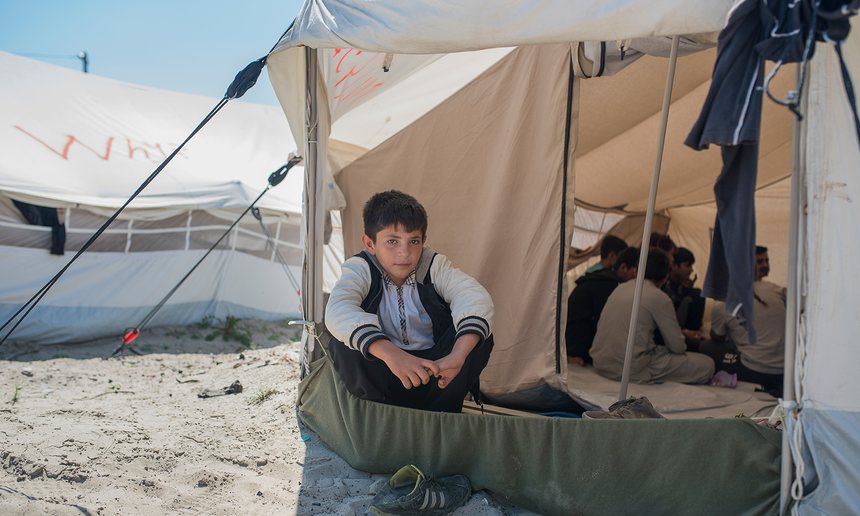
Photograph: Alecsandra Raluca Drăgoi for the Guardian
His nine-year-old nephew is so terrified by their nightly efforts to get to England that Abdul has to use all his energy to shield him from the reality of what they are trying to do. Often he falls asleep by the motorway when he is meant to be waiting to climb on the top of lorries, and is frightened when he is asked to climb on to the trucks.
“I tell him we’re just going for a little walk to see something, that we’re going on a little adventure. I don’t explain what’s really happening, otherwise he gets scared,” said Abdul.
Clegg is dismayed to see young children forced to take care of younger relatives. “It’s not OK for a 10-year-old to be responsible for a nine-year-old in a place like this. I can’t even explain how wrong the situation is without swearing.” She has observed the children’s mental state rapidly deteriorate when they realise they are stuck in the camp, with no one to take care of them, and is unable to offer much comfort.
Most of the children are from Afghanistan, sent to get them away from the Taliban or Islamic State and rising violence. There are a smaller number of unaccompanied Syrian children, many of whom have relatives in the UK and are waiting for reunification applications to be approved. Clegg tries to advise the older children to abandon their quest to come to the UK, warning that particularly those from Afghanistan may have little prospect of being allowed to remain once they turn 18, suggesting that they apply for asylum in France instead; more than 300 already have. But these children, travelling alone, are conscious that their parents have sacrificed a lot to pay for them to escape to the UK and feel unable to make a well-informed decision about what to do. They know very little about the UK, speak little English, but have been told that England is a “good country” where they will be looked after.
All of the boys from Afghanistan describe violence and oppression in their home villages, both at the hands of Isis and the Taliban. Mostly they are not seeking to bring the rest of their family to the UK (and probably would not be eligible to under immigration law). They have been sent away by parents who believe they are dispatching them to a place of greater safety and better future prospects.
Given the children’s dire predicament, stuck in the slum wastelands, charities question why the UK government is not fulfilling its commitment to helping them. Campaigners called on the government to bring hundreds of children over before the start of the new school year to ensure that child refugees who had missed out on months, if not years, of school because of war and unrest could be reintegrated into the education system as soon as possible. This now looks unlikely.
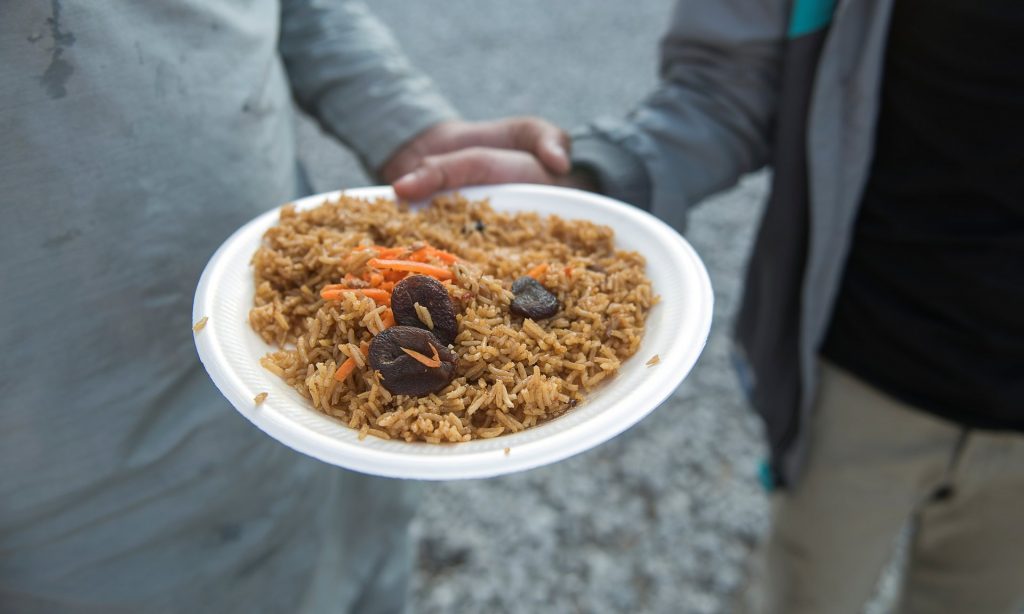
Photograph: Alecsandra Raluca Drăgoi for the Guardian
Josie Naughton, from Help Refugees, which helps fund the Women and Children’s centre and provides food and clothes to the camp, said: “Tonight, 608 unaccompanied children in the ‘Calais Jungle’ will go to sleep yet again in a state of fear, uncertainty and without protection. The youngest is eight years old. The British and French authorities know they are there yet they continue to turn the other way. Three months ago, the Dubs amendment was passed; as it stands this has amounted to nothing. We implore the government to act on its promise and bring these children to safety.”
George Gabriel, of Citizens UK, which has been fighting to speed up the reunification of child migrants who have family in the UK, was dismayed at a Home Office victory in the high court on Tuesday that looks set to considerably slow down the process for family reunifications, meaning children with relatives in the UK will be stuck for longer in the camp. Progress for children who could be helped by the Dubs amendment was even slower, he said. “Not a single official has been seen in camp looking for children who might be eligible under the terms of the Dubs amendment. There is a group of children who are eligible, 35 miles away, living in a muddy field surrounded by every kind of danger. An act of parliament was passed, the UK authorities should act on it.”
Lily Caprani, from Unicef UK, said: “The UK government promised to resettle some of the most vulnerable unaccompanied children from Europe, yet this process is moving far too slowly. Each day that these children remain alone is another day living in desperate conditions, at constant risk of violence, exploitation and abuse. It is vitally important that the UK government urgently speeds up the process for bringing eligible children here safely and legally.”
There is widespread uncertainty among charities about how in practical terms they can use the Dubs amendment to get vulnerable children to safety.
A spokesperson for the UNHCR said it had been asked to support the UK government in implementing the Dubs amendment but indicated that the process would be slow: “UNHCR and NGO partners are actively involved in ongoing discussions with the Home Office to provide support on the operationalisation of the amendment, including in France, Italy and Greece. This is a very complex process as it involves vulnerable children with a particular profile. The final decision as to which unaccompanied child will be transferred to the UK lies squarely with UK and the other concerned European governments.”
A Home Office spokesperson said the government had made “crystal clear” its commitment to help and was in active discussions with the UNHCR and the Italian, Greek and French governments to speed up mechanisms to identify, assess and transfer children to the UK.
Ahmed, 12
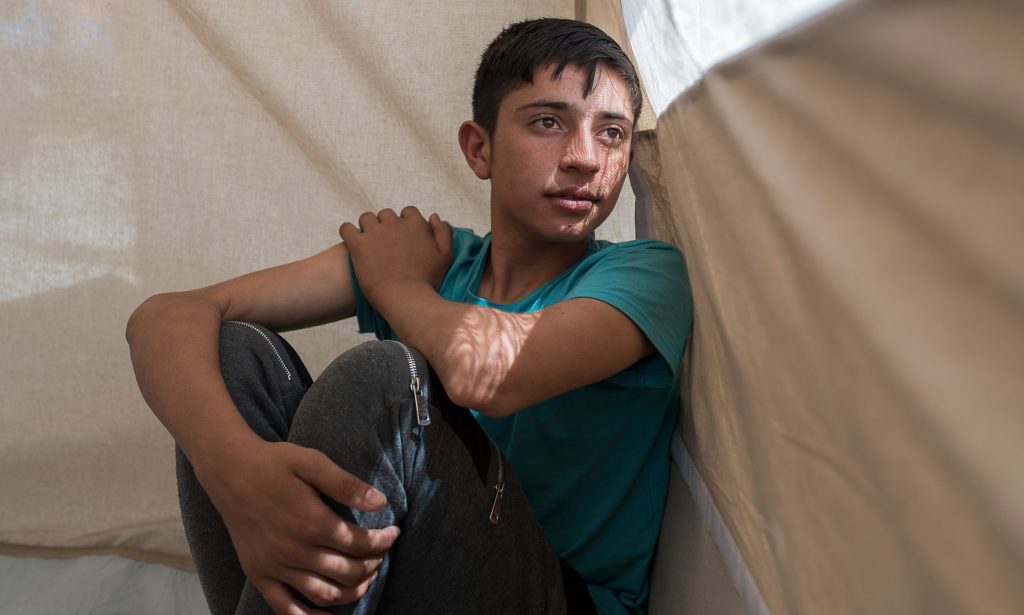
Photograph: Alecsandra Raluca Drăgoi for the Guardian
He was sent alone from his village in Afghanistan in January because Isis had arrived in the area and his parents feared for his safety. “They sent me because my life was in danger. No one is safe in Afghanistan,” Ahmed said. He has three younger brothers, all at risk too, but his parents could only afford to send one child away. His family were very sad when he left, but he tried not to show how he felt. He has been living in a tent in Calais for four months, trying to get to the UK every night. He has frequently been stopped by the police. They have never asked him his age, or tried to get him a foster family. He is upset by the closure of the children’s cafe. “There is not enough food now. We are hungry.”
Mohammed, nine
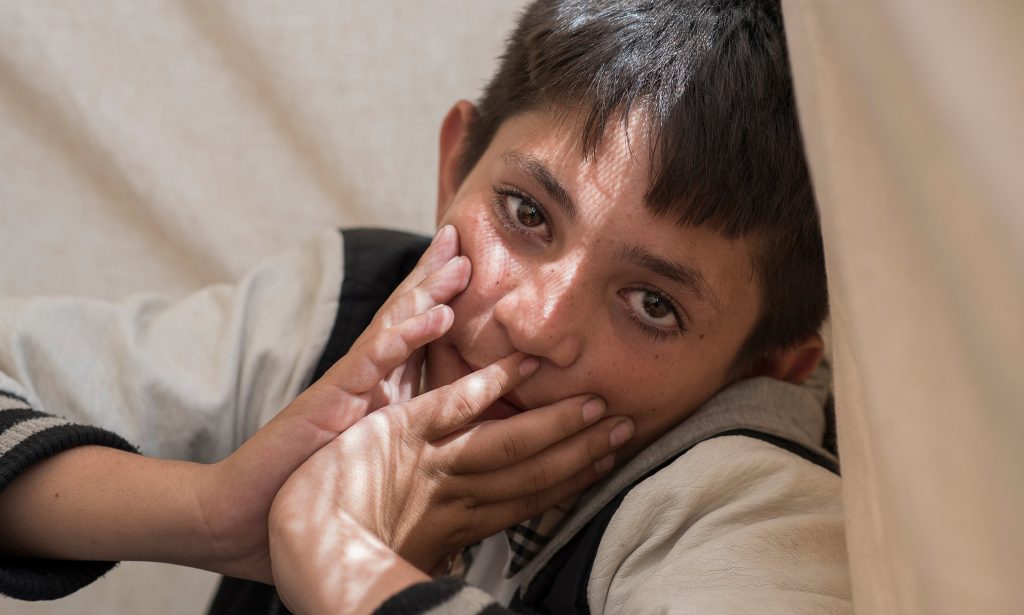
Photograph: Alecsandra Raluca Drăgoi for the Guardian
He travelled through nine countries with Ahmed, his cousin. His father, who owns a small shop, was also worried for his future when Isis arrived last year. “At the school, we used to learn useful things like English, but over time the curriculum became increasingly religious and then jihadi,” he said. When boys began to be taught about the reward in paradise for suicide bombers, he told his parents, who decided to get him out. Shortly afterwards, fighting broke out in the area between the Taliban and Isis. Initially, he did not want to leave his family. “Later my mother and father said there is a good life for you there; there is no life for you in Afghanistan, but there you will have schools and education. I agreed.” Asked if he misses home, he is looked uncomfortably at the floor, and said: “Of course.”
Omar, 12
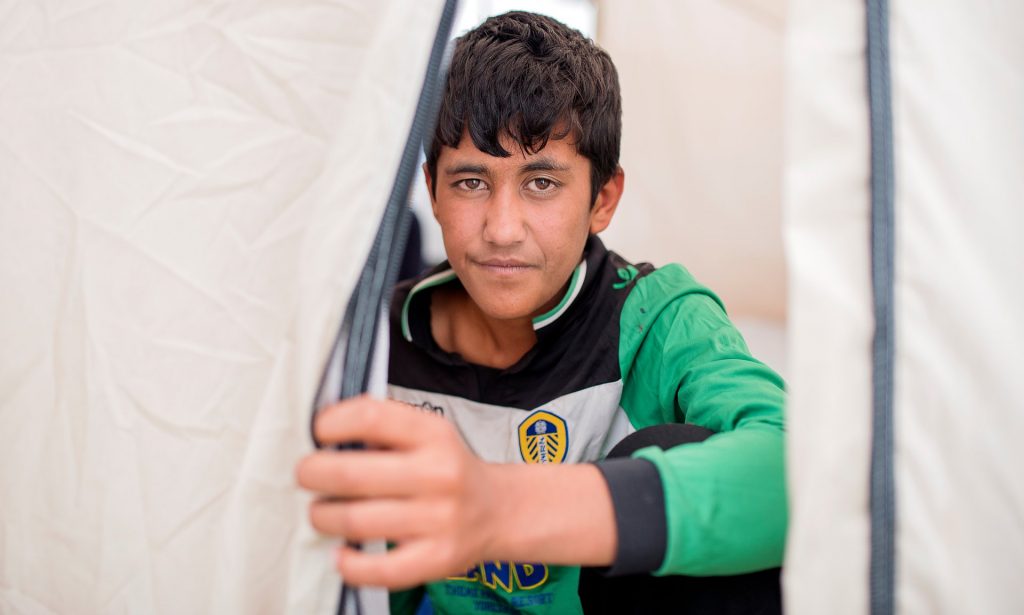
Photograph: Alecsandra Raluca Drăgoi for the Guardian
His parents were told by Isis they should either send their son to fight for them, or pay money. His father, a lorry driver, decided it was better to get Omar out of Afghanistan. He packed some clothes, soap and a photograph of his brother. He does not want to claim asylum in France because his parents told him to go to England, and because his understanding of what France is like is based both on the unfriendly treatment he has received from the police and his negative impressions of conditions in the camp. “The French haven’t helped me. I’m scared of the police. When I see the situation in France – it is very bad, I think my parents are right.” When he left, his parents told him to be good and study hard. “I want to have a good education.”
Abdul, 10
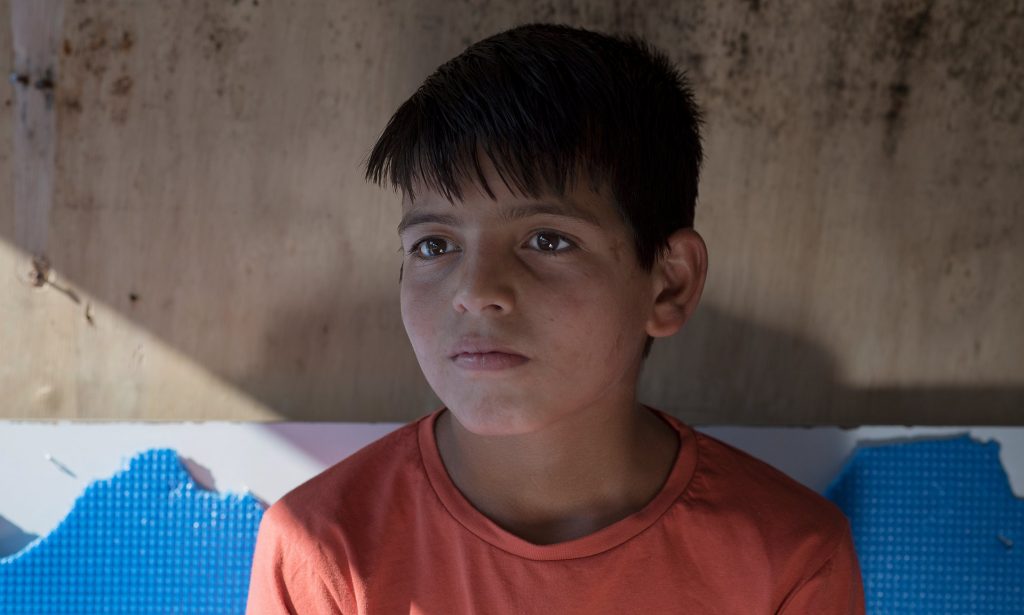
Photograph: Alecsandra Raluca Drăgoi for the Guardian
His father is dead and his mother wanted to send Abdul away from the rising violence in his village. His uncle arranged for him to travel and did not tell his mother when he would leave, to make it easier for her (which meant he was not able to say goodbye). He understood why she sent him. “I knew it was dangerous in Afghanistan. There was bombing and violence every day.” He travelled to France with his nine-year-old nephew, and both children are finding life in the camp hard. Partly it is the difficulty with food but also the daily stress of trying to move on. “I am a child. I want to play football.” When he’s older he wants to be “an engineer and a doctor”. “I want to provide a service for people; if there is war in Afghanistan then I’ll do that in England. If there’s no war in Afghanistan then I want to go home.”
- All the names of the children mentioned in this article have been changed.

